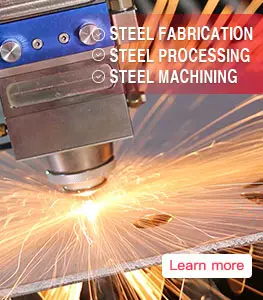Welcome to BBN Steel Materials Factory
RSt 37-2 chemical composition with DIN 17100 standard

RSt 37-2 carbon steel is a type of structural steel that is used in the construction and engineering industries. RSt37-2 steel is known for its high tensile strength and impressive chemical composition. DIN 17100 is a German standard that outlines the general structural steel grades and mechanical properties of non-alloyed steels. RSt 37-2 is one of the grades that fall under this standard.
The chemical composition of RSt 37-2 is as follows:
- Carbon (C): 0.17%
- Manganese (Mn): 1.40%
- Phosphorus (P): 0.045%
- Sulfur (S): 0.045%
- Silicon (Si): 0.55%
- Copper (Cu): 0.55%
- Nitrogen (N): 0.009%
- Vanadium (V): 0.008%
- Titanium (Ti): 0.03%
- Aluminum (Al): 0.020%
Carbon is an essential element in steel that adds strength and durability to the material. The 0.17% carbon content in DIN 17100 RSt 37-2 carbon and low-alloy steel makes it a mild steel with good tensile and yield strength. It also helps to improve the corrosion resistance of the steel.
Manganese is another critical component of steel that contributes to its strength and hardness. The 1.40% manganese content in RSt 37-2 makes it a high-strength steel with excellent impact and wear resistance.
Phosphorus and sulfur are impurities present in steel that can affect its mechanical properties. The DIN 17100 standard specifies a maximum phosphorus and sulfur content of 0.045% each in RSt 37-2. These impurities can reduce the ductility and toughness of the steel, causing it to be brittle and prone to cracking.
Silicon is added to steel to improve its resistance to oxidation and scaling at high temperatures. It also helps to enhance the strength and ductility of the steel. The 0.55% silicon content in RSt 37-2 contributes to its excellent corrosion resistance and weldability.
Copper is often used as an alloying element in steel to improve its strength, corrosion resistance, and thermal conductivity. The 0.55% copper content in RSt 37-2 helps to enhance its resistance to atmospheric corrosion and make it suitable for outdoor applications.
Nitrogen, vanadium, titanium, and aluminum are trace elements that are present in small quantities in RSt 37-2. These elements do not significantly affect the mechanical properties of the steel, but they can enhance its microstructure and improve its resistance to wear, fatigue, and thermal shock.
The high tensile strength and yield strength of RSt 37-2 make it a strong and robust material for structural applications. The 25% elongation shows its excellent ductility, which allows it to absorb energy before fracturing. The high impact strength of 27 Joules at room temperature indicates its ability to withstand shock and vibration.
RSt 37-2 carbon and low-alloy steel is used in various structural and engineering applications, such as:
- Construction of bridges, buildings, and tunnels
- Manufacturing of machinery, equipment, and vehicles
- Fabrication of pipelines, storage tanks, and pressure vessels
Its high strength, excellent corrosion resistance, and good weldability make it suitable for outdoor and harsh environments.
.webp)
.webp)
.webp)
.webp)
.webp)
.webp)
.webp)
.webp)
.webp)



Leave a Message